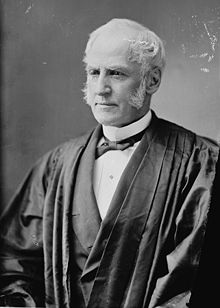Ward Hunt
Ward Hunt (* 14. June 1810 in Utica , New York ; † 24. March 1886 in Washington, DC ) was an American lawyer and politician of the Democratic Party , who also judges at the Supreme Court of the United States ( US Supreme Court ) was .
Life
After attending school, Hunt, who was a classmate of the future Governor of New York Horatio Seymour , studied first at Hamilton College and then at Union College , which he graduated in 1828. He then studied law at Litchfield Law School and was admitted to the bar in New York State in 1831 . He then founded the law firm Denio & Hunt as a partner with his college friend and later two-time President of the New York Court of Appeals , Hiram Denio , and subsequently worked as a lawyer .
A few years later he began his political career and was elected a member of the New York State Assembly for the Democratic Party in 1838 . In 1844 he was mayor of his native Utica. After moving from the Democratic Party to the Free Soil Party in 1848 , he finally became a member of the Republican Party in 1856 .
In 1865 he was himself a judge at the New York Court of Appeals and was its President ( Chief Judge ) from 1868 to 1869 .
On January 9, 1873, Hunt was appointed by US President Ulysses S. Grant as an associate judge at the US Supreme Court, where he was the successor to Samuel Nelson . Hunt, who had been paralyzed by a stroke from 1878, held the office of Associate Judge until January 27, 1882.
In 1873 he chaired the United States v. Susan B. Anthony . The case against Susan B. Anthony was about her becoming the first woman to be registered as a voter in a presidential election in the United States and to cast her vote in the 1872 election. She was convicted in June 1873 for unlawful electoral influence in a sensational trial. During his membership in the US Supreme Court, among other things, in March 1880 he worked on the decision on the Strauder v. West Virginia , according to which the general exclusion of blacks from jury courts is unconstitutional because it violates the 14th Amendment to the US Constitution.
After leaving the judicial office, he was replaced by Samuel Blatchford and, after his death, buried in Forest Hill Cemetery in Utica.
Publications
- Case of Susan B. Anthony , 1873
Web links
- Ward Hunt in the database of Find a Grave (English)
- openlibrary.org
Individual evidence
| personal data | |
|---|---|
| SURNAME | Hunt, Ward |
| BRIEF DESCRIPTION | American lawyer and politician |
| DATE OF BIRTH | June 14, 1810 |
| PLACE OF BIRTH | Utica , New York |
| DATE OF DEATH | March 24, 1886 |
| Place of death | Washington, DC |
